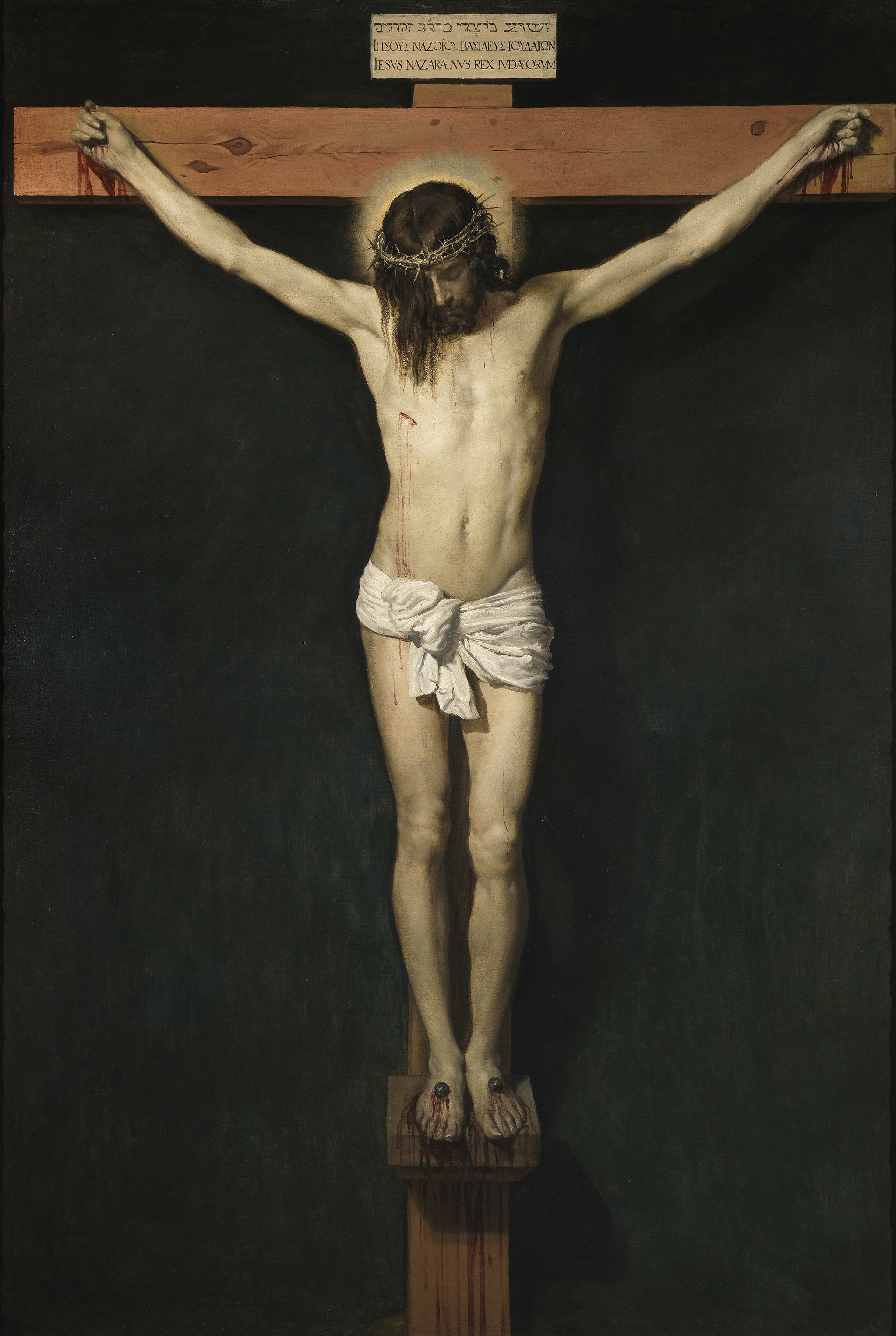
-“Christ Crucified”, (c. 1632) by Diego Velázquez. Museo del Prado, Madrid

-by Nick Chui
“Why did God create creatures capable of sinning?
I guess we can flip this question around. Why did God create creatures capable of loving? To love means to have free will. Could God create creatures without free will? Yes He could. In fact He already has, by creating the plants and animals. Human beings (and angels) on the other hand, are creatures with free will, capable of choosing love. On the flip side, they are also capable of choosing selfishness. Choosing to be selfish is sin.
Did God know that His creatures would sin?
He would surely know. When He created creatures with free will, the possibility of disobedience/selfishness was in-built into the equation. Does He will that we sin? No He does not. But can God foresee the possibility? Yes He could. Take for instance the relationship between parent and child. After giving their child a good education for instance, can they foresee that it is possible for them to abuse it? Indeed they could. Nevertheless, they can also foresee them making use of this gift to serve society. And if they freely choose the loving act, it is a wonderful thing, it’s not something “forced.”
If His creatures were to sin, was the death of His son the only way to rescue/save them?
St. Augustine and St. Thomas Aquinas, two giants in Catholic theology, answer “No”. God is sovereign; He could choose other ways. He could simply forgiving them. In fact, He already did so as described in the book of Genesis. He banished Adam and Eve to be sure, because they seemed not to have been aware of the gravity of their actions, i.e. wanting to be like God (on their own terms), knowing (determining) good and evil. However, He showed that he cared for them by “making them garments of skins and clothing them.” (Gen 3:21)
In fact, in the entire Old Testament, God teaches Israel how to obtain forgiveness, through very precisely prescribed sin offerings via worship in the temple. The Psalms, especially Psalm 51, are full of episodes of the human person recognizing his fault and being confident that he is forgiven.
If that is the case, then why must He send His Son to earth, if not on a rescue mission?
Blessed Duns Scotus, another giant in Catholic theology, answers in the following manner: “The incarnation was the greatest and most beautiful” of God’s works and is not “conditioned by any contingent facts.” God has always planned to “unite the whole of creation with Himself in the person and flesh of the Son.”
In other words, His Son coming to earth was not “plan B” but always part of God’s intention from the beginning. If our first parents did not sin, nor subsequent human beings, then the incarnation would be like a courtesy call, something like the prince visiting the dwellings of his subjects to have tea with them. It would be something very happy and most pleasant. In fact, C.S. Lewis tries to imagine such a scenario in his space trilogy.
Even if our first parents sin, and so did subsequent human beings, the Son of God will nevertheless keep His appointment. Hence in the fullness of time, the incarnation, in a situation of dysfunction. One of the things that the Son of God needs to do is precisely to heal the dysfunction.
Why must the rescue mission involve the crucifixion?
We must be very clear on this. God is not appeased when He sees blood. As you mention so correctly, it is ludicrous for someone convicted of murder to escape scot-free because the judge agrees that his own innocent son can take his place and die instead. This is not mercy. This is perversion. This is not Catholic teaching. Perhaps certain Protestant groups hold to this. It’s called penal substitution.
The crucifixion is not necessary, in the strict sense, for salvation. Why then did the Son willingly subject Himself to this?
Perhaps Plato might help. Plato wonders what would happen to a perfectly righteous man if he steps into a society full of people who are dysfunctional and tries to help them. Plato concludes that these people would mostly likely crucify him.
What Plato highlights is the stark but terrible reality of human beings. We are often comfortable with our wrongdoing/selfishness and dysfunction. We don’t believe we need rescuing. If somebody who is righteous comes along and shows us a better way, we may well be resentful and feel it best that he gets lost. Maybe we want to put him to death in our hearts.
In the time of Jesus, crucifixion was Rome’s way of telling the enemies of Rome to conform. If you try rebellion, this is what will happen to you. When Jesus preached the kingdom of God, love, brotherhood, and worked His miracles among poor people, and later made gradual claims about His divinity, it was too much for both the Jewish people and the Roman governor Pontius Pilate. What Jesus seems to be preaching is a rival kingdom. Of course He has to die. And Jesus was willing to pay the price for the kingdom.
But how does His willingness to pay the price “save” me?
Catholics have divided the effects of Jesus’ death into two categories. His death as example, and His death as expiatory (making up for what we cannot).
Let’s deal with the example first.
The question for me, and perhaps for humankind, is “are we really that bad?” Surely, I am not personally responsible for the death of Jesus? A popular hymn we sing at good Friday is “Were you there where they crucified my Lord?” Of course we were not there. But what if we were? Will we join in the crowd and shout “crucify him” due to cowardice? Or turn away and say “I prefer to mind my own business?” Or if we stand in solidarity with His Mother, do we not also feel the great sorrow at a man Who did no wrong and yet suffered in that manner? And what if this was no ordinary righteous man, killed by evil men (an often too familiar action). What if this righteous man was God incarnate? Does this mean that in our free will, we are capable of killing God? And if we are capable of killing God, do we even deserve to be forgiven?
Applying it to our contemporary context, do we dare say we do not turn a blind eye to the evil around us? Are we also not complicit?
The answer from the cross is Yes. “Father forgive them for they know not what they do” (Luke 23:34). And if we are “cut to the heart” and realize that we are indeed capable of crucifying the Son of God, we may well cry out like Peter in a paradoxical way “leave me Lord, for I am a sinful man” (Luke 5:8) while at the same time clinging on to Him tightly.
Hence His death saves us in an exemplary sense, because we may well be “cut to the heart”. We are indeed sinners; we have nothing to boast about. We need a Savior. And God, from the cross, has already given the verdict. If you recognize your need for a Savior, you will indeed be forgiven, for we know not what we do.
How is Jesus’ death “expiatory” i.e. making right what we cannot?
Perhaps in comfortable modern society, we can make the case “saying sorry is enough and relationships can be restored.” We don’t encounter horrific evil that often. At least not personally. But think of the Japanese Occupation. Is “saying sorry” enough for a Japanese soldier who may have tortured and brutally murdered the husband of an innocent woman?
No matter how sincere, even if the Japanese soldier were to commit seppuku in atonement, can we say that he has successfully “made up” for the evil he has done? Could we describe his death as “expiatory”?
While it is possible that his asking for forgiveness is sincere, and his sacrifice wholehearted, can he actually “make things right” for the woman after he has tortured and killed her husband? It is not possible.
This is where only the intervention of someone Who holds the power of life and death and can make things right in a more than earthly sense becomes perhaps fitting.
Jesus is that someone. He is a man: He can be our true representative. He is God: His life given up willingly can actually make things right again. Why? Not because God the Father demands blood (He does not) but because the order of justice can actually be restored only through Someone Who is of cosmic importance.
For the Japanese soldier, in Christ, his attempt at expiation is made possible. For the victim, in Christ, the expiation (making right) not possible through the death of the Japanese soldier, becomes possible, since Christ holds the power of life and death.
In the Old Testament, the temple sacrifices of animals in atonement for sins is a constant pedagogical reminder to the people. Making things right is important. And yet the sacrifice of lambs can only be symbolic. For very serious breaches, forgiveness is always possible. Making things right, “expiation”, however, is beyond your capability because in the final analysis, via a sacrificial animal , it can only be symbolic. You need YHWH Himself to provide the solution through His Messiah.
Hence the book of Hebrews has a very prescient observation (Hebrews 10:11-14):
“Day after day every the priest stands and performs his religious duties; again and again he offers the same sacrifices, which can never take away sins [referring to atonement not so much forgiveness]. But when this Priest [Jesus] had offered for all time one sacrifice for sins, He sat down at the right hand of God, and since that time He waits for His enemies to be made His footstool. For by one sacrifice, He has made perfect forever those who are being made holy.“”
Love, Blessed Good Friday,
Matthew
